January 31, 2020
![]() 8 mins Read
8 mins Read
Far away from the pernicious light pollution that hovers over cities, in the Warrumbungle National Park near Coonabarabran in central-west New South Wales, is Australia’s first Dark Sky Park.
What on earth is a Dark Sky Park? According to the International Dark-Sky Association, it’s a place to see our and other universes with uncommon clarity; a nocturnal viewing environment so exceptional that it warrants protection from light pollution. Other esteemed members of the Dark-Sky posse include Joshua Tree (USA) and Jasper (Canada) national parks.
Siding Spring Observatory surveys the gargantuan Warrumbungle landscape and skyscape from a 1200-metre-high ridgeline on the national park’s edge. About 40 telescopes of varying sizes sprinkle the bush, giving the observatory the air of a Rebel base in a Star Wars film. Some are remotely operated from places far, far away, too, such as Hungary and Japan. Armed with its 3.9-metre mirror, the Anglo-Australian Telescope (AAT) is undoubtedly Siding Spring’s mothership. Australia’s largest optical telescope can ‘see’ quasars (gas revolving around a ‘supermassive’ black hole) up to 12 billion light years away.

The starry night sky lights up Belougery Spire.
Keeping the Dark Sky Park dark is the Warrumbungle’s very own Prince of Darkness, Siding Spring director Dr Chris Lidman. The observational cosmologist monitors ‘scattered light’ from nearby settlements like Dubbo and tells them off if they glow too brightly. Even the astronomers’ bedrooms here wear mandatory black-out shades. Dr Chris says the high-and-dry perfect storm of Warrumbungle darkness is as good as he experienced working in the higher and dryer climate of Chile’s Atacama Desert.
While you can’t stare into the ATT itself, Dark Sky Traveller tours navigates you around the incredible six-storey beast. The scope of what this ‘scope does is mind-wobbling. Often the astronomers just explore exosolar planets (outside our solar system). Sometimes they snap on the multimillion-dollar 2dF ‘top end’, which can “look at 400 objects at once”, to try to measure the properties of ‘dark energy’.
The control room’s delightfully retro dials and knobs look like a moon-landing film set, way less cluttered than it used to be now that they’ve cleared the half-room of computers it took to operate the ATT back in 1974. In theory, your iPhone can do it nowadays.
A walk around the outside of the dome offers cosmic daytime vistas up to the volcanic landscape’s crown of jagged outcrops, the Grand High Tops, standing illustrious like giants with wisdom to impart. Meet them face to face on one of the national park’s invigorating trails, such as the Breadknife and Grand High Tops walk or the shorter Fans Horizon Walking Track. As nightfall approaches, wind down the World’s Largest Virtual Solar System Drive – featuring three-dimensional billboards of the planets – into Coonabarabran’s foothills, where a cluster of cosmos connoisseurs are itching to show you the universe.

The sun rising over the Breadknife and Grand High Tops walking track in Warrumbungle National Park.
Check into family-friendly Skywatch Observatory B&B, a comfortable two-bedroom space complemented by a relaxed high-ceilinged entertaining area featuring co-owner Merrill Sana’s abstract “paintings of music”. Outside, underneath Skywatch’s own dome (built as a mini-sister to Siding Spring in 1994), a retro mini-golf course quirkily sets the scene for tonight’s astral adventures.
Co-owner Gary Erikson, who fell in love with astronomy at eight-years-old “when the moon landing blew my mind on our little six-inch TV”, is happy to stay up late to give you a guided tour of the sky and a Big-Bang lesson through his 14-inch Meade telescope. “Astronomy is a numbers thing, but I want to show people the beauty of the stars, awaken them to the sky. People always go away with much brighter eyes than when they started.”
A few minutes’ drive away, Warrumbungle Observatory offers an abridged astronomy refresher-course projected onto the side of one of its domes before all eyes turn skyward through one of Peter Starr’s telescopes. If you think Starr is an uncanny aptronym, the astronomer and former Siding Spring site manager says he’s “worked with a Moon and a Stella before”.
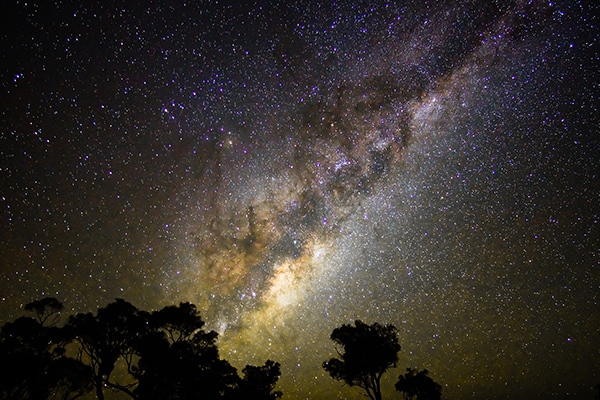
The Milky Way radiating over eucalypts.
As crickets softly chirp, the dome whirrs quietly open. We focus on a spiral galaxy not unlike ours, except it’s 20 million light years away, 100,000 light years in diameter. We pan across to the relatively close Orion Nebula ‘four-star system’ then find the spectral Tarantula Nebula located in a dwarf galaxy known as the Large Magellanic Cloud.
Closer to Earth, Elon Musk’s Starlink satellites drift across the night sky every 10 minutes, according to Peter, who can show you how to take a long-exposure, colour-rich photograph of your favourite phenomena.
Pockets of dark-sky worshippers are cropping up across the New South Wales outback from Narrabri and Parkes to Wilcannia and White Cliffs.
By day, Australia’s first Heritage-listed city, Broken Hill, is its own eccentric universe ripe for exploration – home to Art Deco Bell’s Milk Bar (complete with rooftop, Martian-manned flying saucer) and art galleries of far-out character.
The short drive out to Silverton, home to one of Australia’s most famous pubs and landscapes (Silverton Hotel stars in Priscilla, Queen of the Desert and Mad Max 2), feels like an interplanetary road-trip.
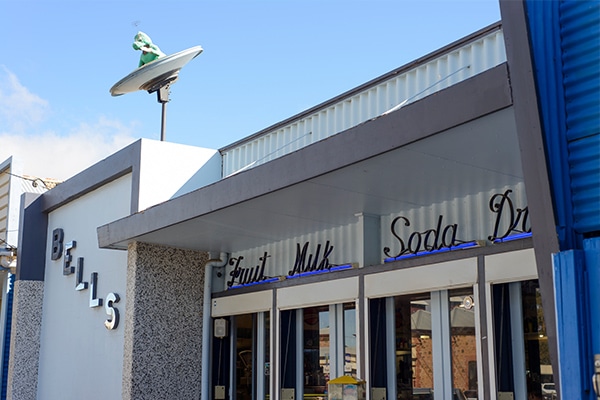
The martian-manned flying saucer on the roof of Bell’s Milk Bar in Broken Hill.
By nightfall, some 10 kilometres out of the Hill, Outback Astronomy Tours – based in an ex-Royal Flying Doctor Service building – takes a laid-back approach to astronomy, quite literally. Drink in the impossibly immense sky on a sunlounge (or is it a moonlounge?), with a nice glass of wine in your right hand, binoculars in your left. Start with a ‘Sunset Sizzle’ or order a snack plate of relatively closely sourced goodies if you’re peckish.
Owner Linda Nadge says you shouldn’t rush straight to the telescope so you can “start to enliven your senses to the natural environment”. She even welcomes a little snooze in her late-night 90-minute experience, but the sensory overload makes that nigh impossible. “Seeing the real sky with understanding eyes makes some people shed tears,” says Linda. “Guests tell us they’re unsure whether it’s joy or despair.”
Except during heavy cloud cover, each night’s sky has something to offer, even when the Milky Way isn’t radiating. Linda knows where the crowd faves are (or aren’t) on any given evening, but be prepared for things she cannot immediately explain.
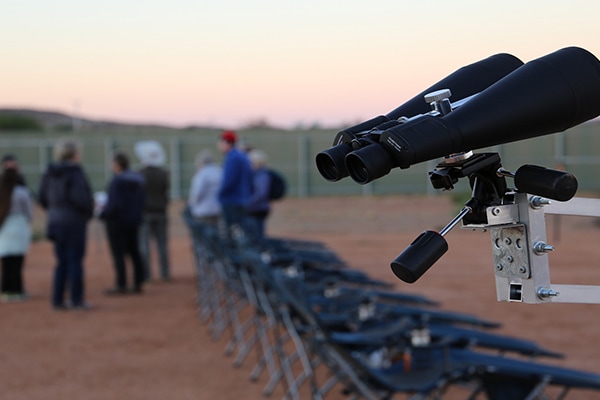
A group prepares for their astral adventure with Ouback Astronomy.
“We see meteors and great fireballs quite often,” says Linda. “We once saw a huge fireball streak across the sky. Some of it seemed to break off; the remnants were found in Lake Eyre. The strangest object [I’ve seen] was just a white cloudy thing, visually about the size of the moon. It was probably frozen liquid oxygen from a Cape Canaveral launch,” she says.
Inevitably, the question arises; the one outback astronomers are often asked: is there life on other planets?
“Absolutely,” Linda says. “We’d be fools to think otherwise, based on statistics and probability alone. Life could have evolved and become extinct somewhere around us and we may never find out.
The first ‘life’ we discover probably won’t be aliens flying spaceships, but microbial life, quite possibly within our own solar system.”
There are no stupid questions out here, and the answers still blow even the astronomers’ minds. The more you look up into the outback’s dark, starry skied possibilities, the more you’ll see. And eyes and minds once opened cannot be closed.
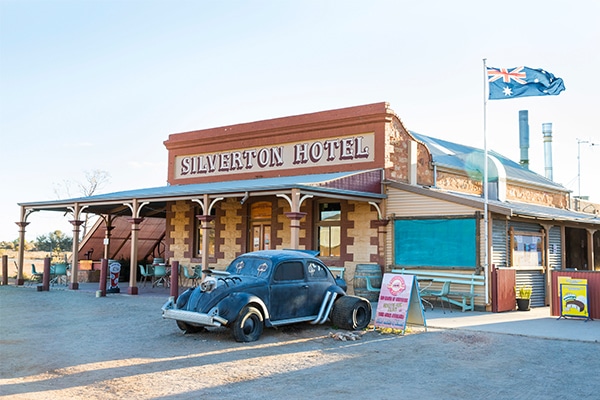
A Mad Max-inspired VW beetle sits outside the iconic Silverton Hotel.
REX flies from Sydney to Dubbo and Broken Hill. Rent a car at Dubbo for the two-hour drive to Warrumbungle National Park. Join the Half Day City Heritage Explorer tour with Away Tours in Broken Hill to see more of the Heritage-listed town. awaytours.com.au
Skywatch Observatory costs $150 per night and includes a country breakfast. Retreat to Broken Hill Outback Resort’s comfortable cabins after your nighttime adventures.
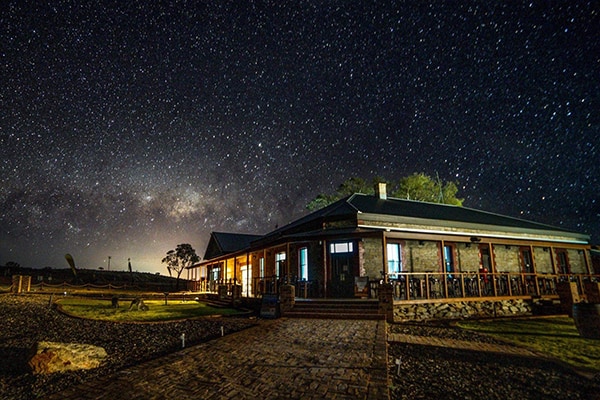
Star trekkers can retreat to Broken Hill Outback Resort after their astronomic adventures.
Start your tour of the universe in Dubbo at the Dubbo Observatory Dark Sky Traveller runs daytime tours of Siding Spring Observatory every Thursday and Saturday, or visit during Starfest over the October long weekend. To see the astronomy experiences on offer at Warrumbungle Observatory visit Tenby Observatory. Hang out with the Stars is Outback Astronomy’s most popular sky show and runs from Thursday to Sunday in winter. Pop into Parkes to see the CSIRO Radio Telescope, star of the movie The Dish, or the six 22-metre antennas used for radio astronomy at Narrabri Observatory.
For the  best travel inspiration delivered straight to your door.
best travel inspiration delivered straight to your door.
LEAVE YOUR COMMENT